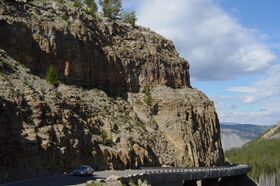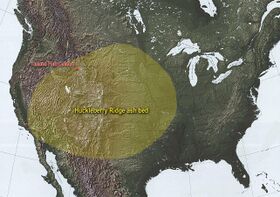Earth:Huckleberry Ridge Tuff
From HandWiki
Short description: Tuff formation in Wyoming and Idaho
| Huckleberry Ridge eruption | |
|---|---|
 The Huckleberry Ridge Tuff along the Gardner River near Osprey Falls, above Mammoth[1] | |
| Volcano | Island Park Caldera |
| Date | 2.1 million years ago |
| Type | Plinian eruption |
| Location | Idaho/Wyoming, United States [ ⚑ ] : 44°20′N 111°20′W / 44.33°N 111.33°W |
| VEI | 8 |
 Huckleberry Ridge ash bed | |
The Huckleberry Ridge Tuff is a tuff formation created by the Huckleberry Ridge eruption that formed the Island Park Caldera that lies partially in Yellowstone National Park, Wyoming and stretches westward into Idaho into a region known as Island Park.[2] This eruption of 2,450 km3 (590 cu mi) of material is thought to be one of the largest known eruptions in the Yellowstone hotspot's history. This eruption, 2.1 million years ago, is the third most recent large caldera-forming eruption from the Yellowstone hotspot. It was followed by the Mesa Falls Tuff and the Lava Creek Tuff eruptions.[3] The eruption likely occurred in 3 phases, separated by decades.[4]
See also
References
- ↑ "Huckleberry Ridge Tuff". https://www.lpi.usra.edu/education/EPO/yellowstone2002/workshop/huckleberry/index.html.
- ↑ Christiansen, R.L., 2001, The Quaternary and Pliocene Yellowstone Plateau Volcanic Field of Wyoming, Idaho, and Montana: U.S. Geological Survey Professional Paper 729-G, 145 p.
- ↑ Yellowstone Caldera, Wyoming
- ↑ Swallow, Elliot J; Wilson, Colin J N; Charlier, Bruce L A; Gamble, John A (2019-07-01). "The Huckleberry Ridge Tuff, Yellowstone: evacuation of multiple magmatic systems in a complex episodic eruption" (in en). Journal of Petrology 60 (7): 1371–1426. doi:10.1093/petrology/egz034. ISSN 0022-3530. https://academic.oup.com/petrology/article/60/7/1371/5524670.
 |

